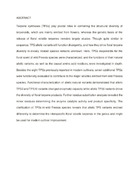Allelic Variation of Terpene Synthases Drives Terpene Diversity in the Wild Species of the Freesia Genus.

View/
Date
2023-03-18Author
Bao, Tingting
Kimani, Shadrack
Li, Yueqing
Li, Hongjie
Yang, Song
Zhang, Jia
Wang, Qiuyue
Wang, Zhaoxuan
Ning, Guogui
Wang, Li
Gao, Xiang
Metadata
Show full item recordAbstract
Terpene synthases (TPSs) play pivotal roles in conferring the structural diversity of terpenoids, which are mainly emitted from flowers, whereas the genetic basis of the release of floral volatile terpenes remains largely elusive. Though quite similar in sequence, TPS allelic variants still function divergently, and how they drive floral terpene diversity in closely related species remains unknown. Here, TPSs responsible for the floral scent of wild Freesia species were characterized, and the functions of their natural allelic variants, as well as the causal amino acid residues, were investigated in depth. Besides the eight TPSs previously reported in modern cultivars, seven additional TPSs were functionally evaluated to contribute to the major volatiles emitted from wild Freesia species. Functional characterization of allelic natural variants demonstrated that allelic TPS2 and TPS10 variants changed enzymatic capacity while allelic TPS6 variants drove the diversity of floral terpene products. Further residue substitution analysis revealed the minor residues determining the enzyme catalytic activity and product specificity. The clarification of TPSs in wild Freesia species reveals that allelic TPS variants evolved differently to determine the interspecific floral volatile terpenes in the genus and might be used for modern cultivar improvement.
URI
https://www.lifescience.net/publications/235578/https://karuspace.karu.ac.ke/handle/20.500.12092/2962